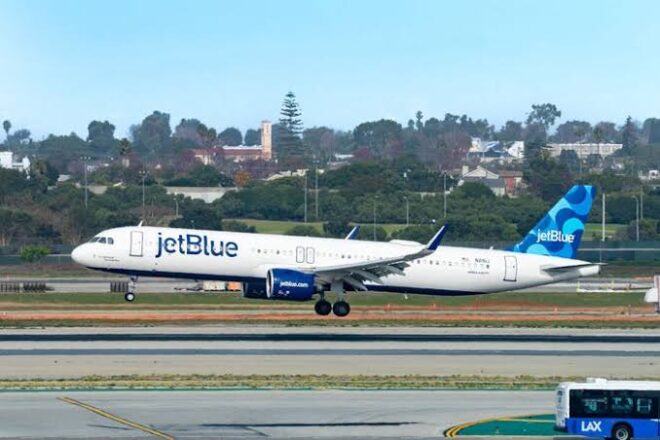
JetBlue Airways, founded in 1998, has grown from a small airline operating a handful of routes to one of the most recognized and respected low-cost carriers in the United States. Headquartered in Long Island City, New York, JetBlue has become synonymous with quality service, innovative features, and a commitment to customer satisfaction.
JetBlue was established by David Neeleman, who aimed to create an airline that offered an affordable yet premium flying experience. The airline commenced operations on February 11, 2000, with its inaugural flight from New York City to Fort Lauderdale, Florida. The company quickly gained traction due to its unique approach to customer service and its innovative business model. JetBlue was among the first airlines to offer in-flight entertainment at every seat, with live satellite television and free Wi-Fi.
Throughout the early 2000s, JetBlue expanded rapidly, acquiring routes in the Caribbean and Latin America. By the end of 2002, the airline had grown to serve over 30 destinations. Its growth trajectory continued through the 2010s, as JetBlue solidified its presence in the transcontinental market, offering services from the East Coast to destinations on the West Coast and beyond.
JetBlue’s business model is primarily based on the low-cost carrier (LCC) framework, which emphasizes low fares and efficient operations. The airline’s strategy includes using a single aircraft type—the Airbus A320 family—which simplifies maintenance and training. This decision has allowed JetBlue to operate efficiently, minimizing costs while maximizing service offerings.
While JetBlue positions itself as a low-cost carrier, it distinguishes itself from traditional LCCs by providing a higher level of customer service. The airline is known for its spacious seating, complimentary snacks, and free in-flight entertainment, setting a new standard for the industry. JetBlue also offers a loyalty program, TrueBlue, which allows frequent flyers to earn points for travel and redeem them for flights and other rewards.
As of 2024, JetBlue operates a modern fleet consisting primarily of Airbus A320 and A321 aircraft, as well as a growing number of Airbus A220 planes. This diverse fleet enables the airline to serve a wide range of routes, from short-haul to transcontinental flights. JetBlue continuously invests in its fleet to improve fuel efficiency and reduce its environmental impact.
JetBlue operates more than 1,000 daily flights to over 100 destinations across the United States, the Caribbean, and Latin America. The airline has a strong presence in major markets such as New York, Boston, and Fort Lauderdale, with its hub at John F. Kennedy International Airport (JFK) serving as a critical point for its operations.
One of JetBlue’s key differentiators is its focus on customer experience. The airline has consistently received high marks for customer satisfaction, often ranking among the best in the industry. JetBlue offers complimentary in-flight snacks and beverages, including a selection of wines and craft beers on select flights, which enhances the overall travel experience.
In-flight entertainment is another standout feature. Passengers can enjoy free live television, movies, and Wi-Fi, allowing them to stay connected during their journey. JetBlue’s commitment to customer service extends beyond the flight itself, with friendly and attentive staff ensuring a positive experience from check-in to arrival.
Like many airlines, JetBlue faced significant challenges during the COVID-19 pandemic. The airline industry was hit hard by travel restrictions and reduced demand, forcing JetBlue to adjust its operations and implement safety measures to protect passengers and crew. In response to the changing landscape, JetBlue introduced initiatives such as flexible booking policies, enhanced cleaning protocols, and contactless check-in options.
The airline also seized the opportunity to innovate during the pandemic, launching new routes and expanding its network to meet the evolving needs of travelers. In 2021, JetBlue announced plans to enter the transatlantic market, offering flights to London from its New York and Boston hubs. This move marked a significant milestone in JetBlue’s growth and expansion strategy, positioning the airline as a more formidable competitor on international routes.
JetBlue is committed to sustainability and reducing its environmental impact. The airline has implemented several initiatives to achieve its sustainability goals, including investing in fuel-efficient aircraft and exploring alternative fuels. JetBlue has set a target to become carbon neutral by 2040, with a focus on reducing emissions and increasing fuel efficiency across its fleet.
In addition to fleet improvements, JetBlue participates in various community initiatives aimed at promoting environmental stewardship and sustainability. The airline collaborates with organizations focused on conservation and climate action, reinforcing its commitment to corporate responsibility.
JetBlue Airways has transformed the airline industry with its unique approach to low-cost travel, prioritizing customer experience and satisfaction. Despite facing challenges, the airline continues to innovate and expand, positioning itself as a leader in the industry. With its commitment to sustainability, customer service, and operational efficiency, JetBlue is poised for continued growth in the years to come, making it a preferred choice for travelers seeking both affordability and quality in their air travel experiences.